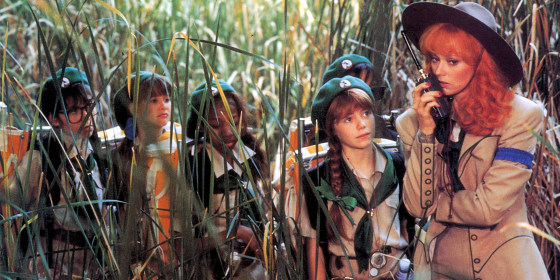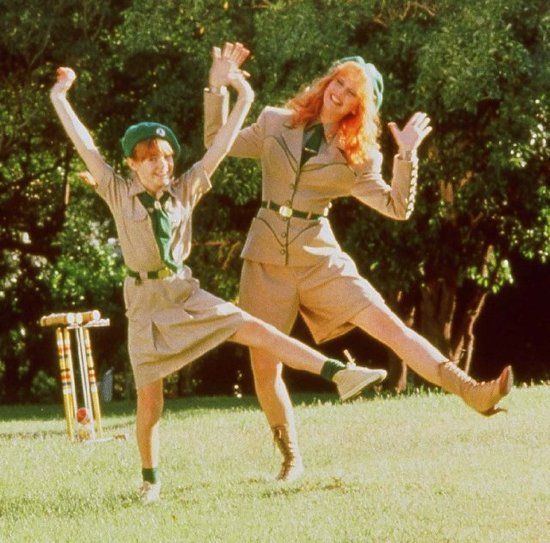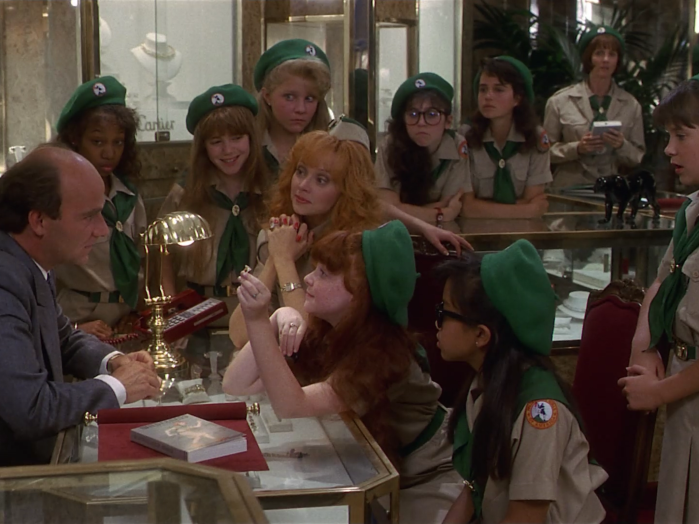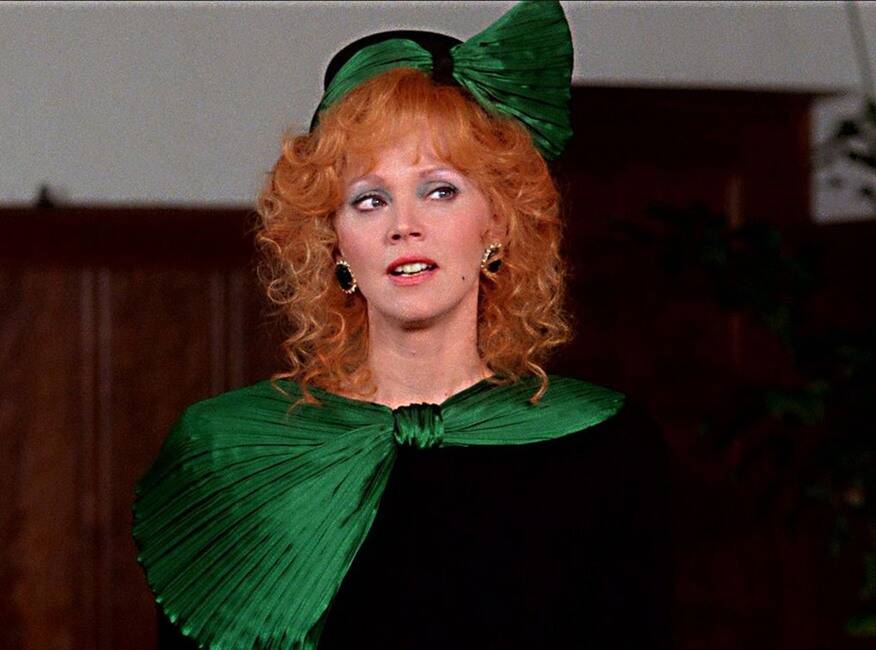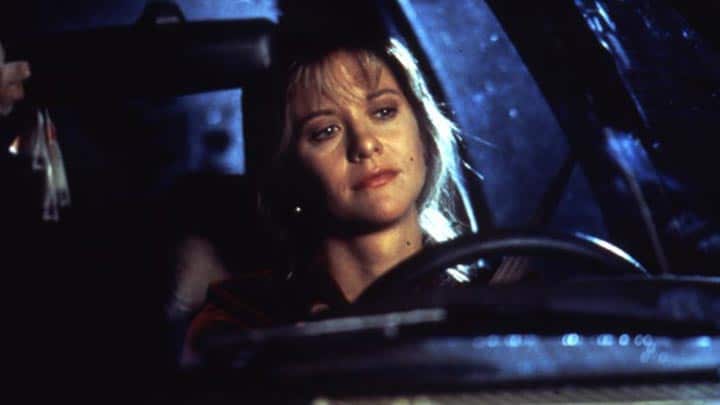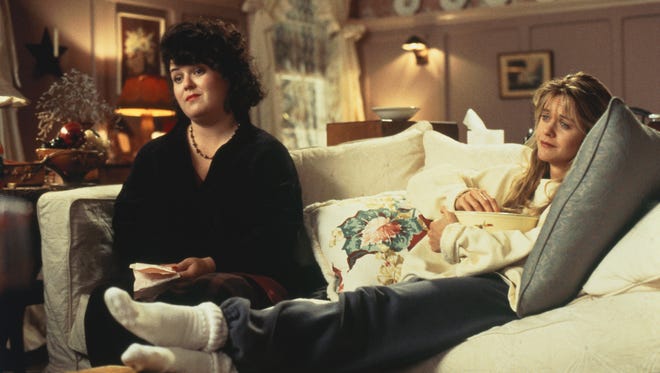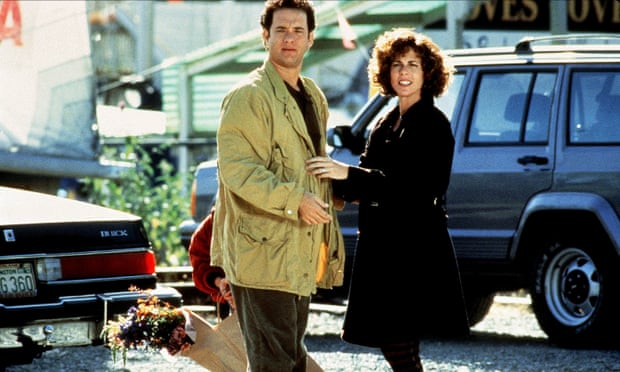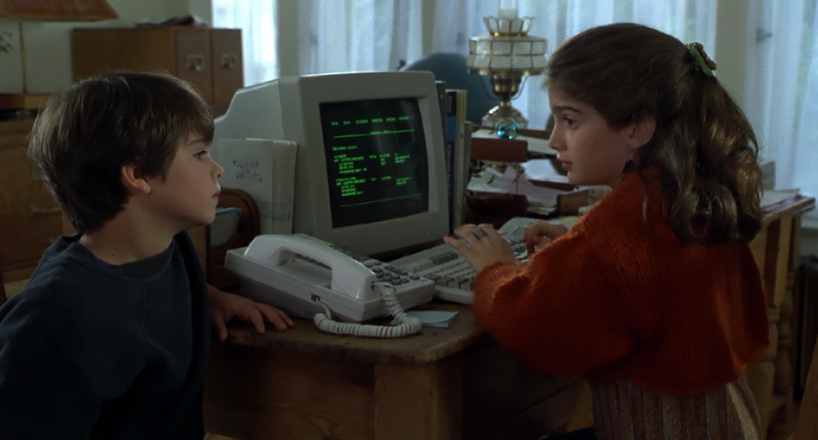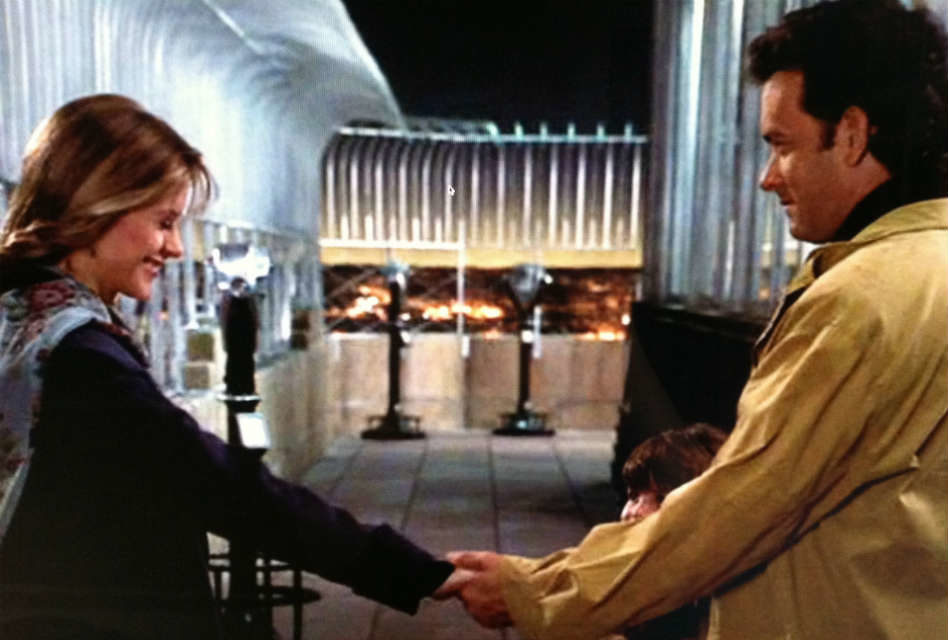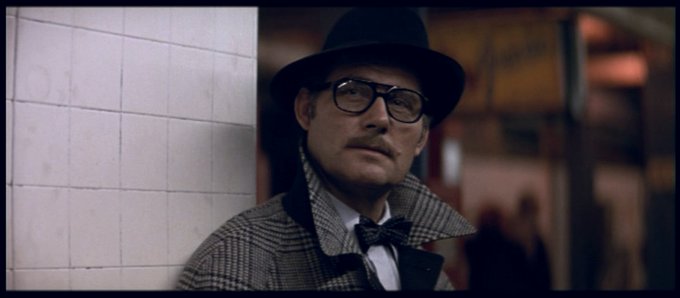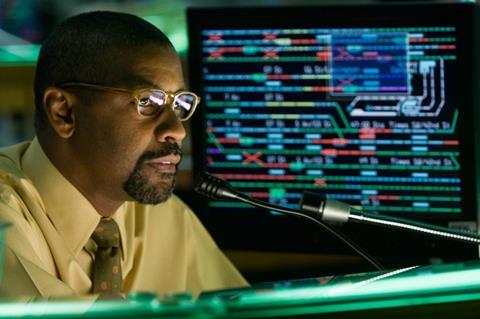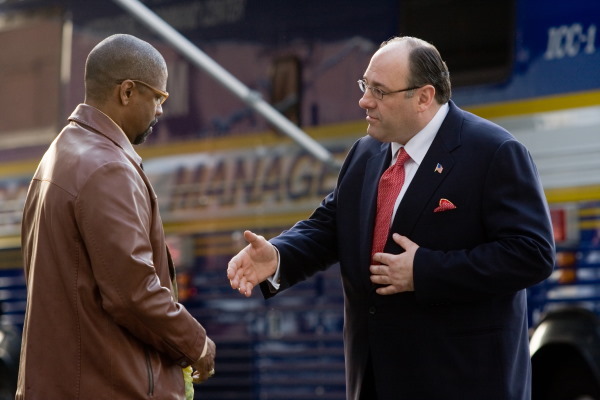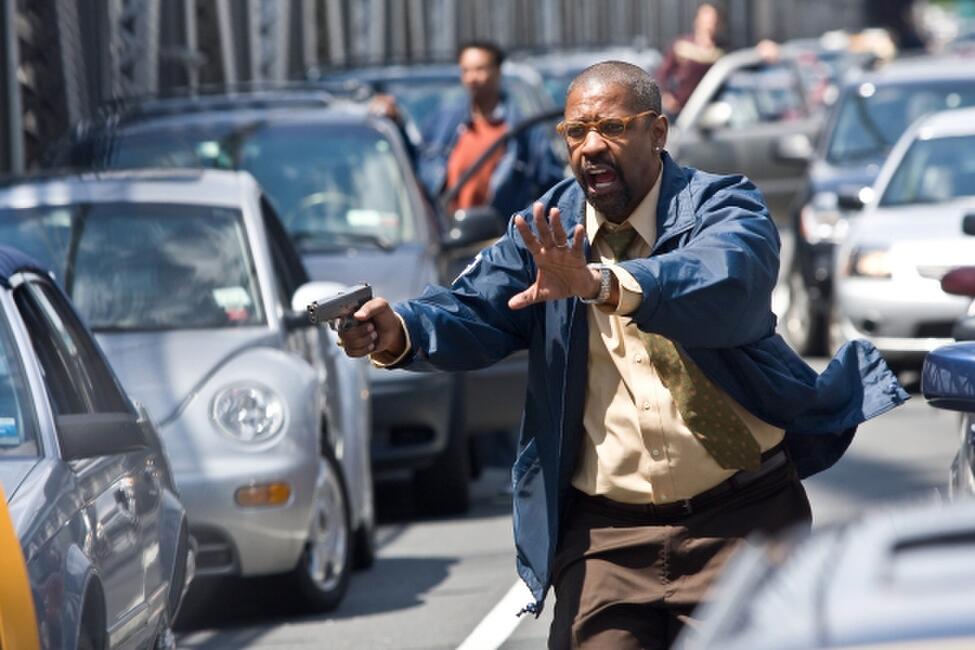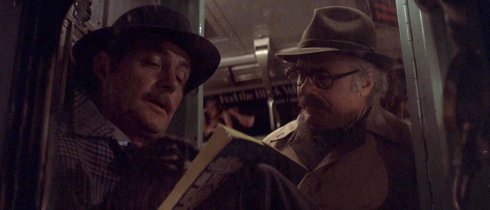Troop Beverly Hills
Director: Jeff Kanew
Cast: Shelley Long, Craig T. Nelson, Betty Thomas, Mary Gross, Jenny Lewis, Carla Gugino, Kellie Martin
How did I go this long without seeing this movie? I am shocked that I never saw it in my childhood; it seems like something I would have loved. But somehow I managed to never see this until now. Honestly, I thought I was going to hate this movie or think it was the stupidest thing ever, but I absolutely loved it. Of course, my standards for it weren't that high, so that may have helped its case! I listened to a podcast review where somebody compared Phyllis Nefler to Elle Woods and being that I love Legally Blonde, it makes sense that I would love this movie too. Both characters are seen as ditzy women who only care about shallow things, but in the end they turn out to be stronger and more independent than anyone realized. You could say that Phyllis Nefler walked so Elle Woods could run. This is a bit of an odd movie in that fact that the rich people - crazy, filthy rich people - are the underdogs and you're rooting for them. In what world are rich people ever the underdogs?
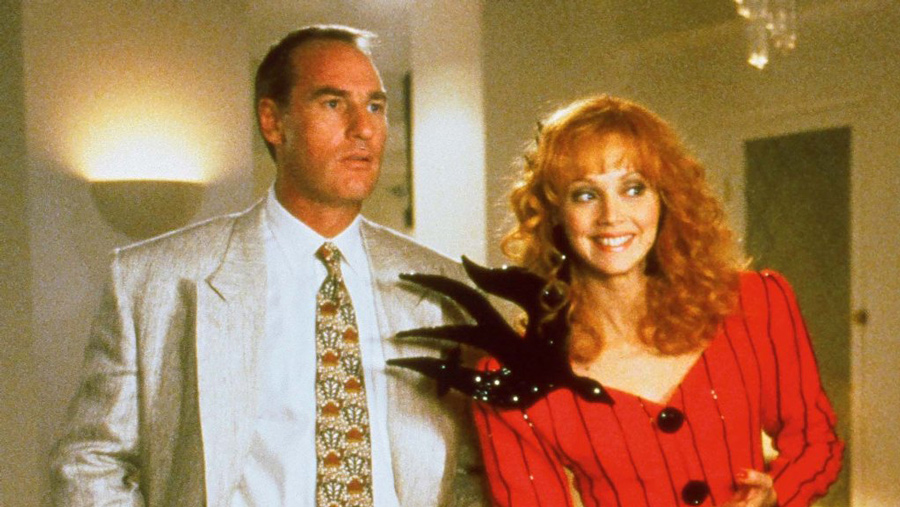 Who is Phyllis Nefler? She is our main character (played by Shelley Long), a Beverly Hills housewife who is separated from her husband, Freddy (Craig T. Nelson), who is living in the pool house until the divorce is finalized. Phyllis's excessive shopping and failure to stick with anything she starts are just some of the reasons Freddy is ready to end their marriage. He's also disappointed because she had "potential" and "energy" and was "so creative". She retorts back and tells him she went shopping to furnish his house and build his perfect image to be his "perfect Beverly Hills wife." The Neflers live in a mansion with a pool and a room that has its own balance beam for their daughter and Phyllis has a walk-in closet so large that she gets lost in it filled with the latest fashions. There's even a landscape mural of a river and green fields painted on the wall behind her bed. They've managed to acquire all of this because Freddy has his own auto shop and is known as "Nefler the Muffler Man." He must have an international chain of these shops because I don't know exactly how lucrative the muffler business is.
Who is Phyllis Nefler? She is our main character (played by Shelley Long), a Beverly Hills housewife who is separated from her husband, Freddy (Craig T. Nelson), who is living in the pool house until the divorce is finalized. Phyllis's excessive shopping and failure to stick with anything she starts are just some of the reasons Freddy is ready to end their marriage. He's also disappointed because she had "potential" and "energy" and was "so creative". She retorts back and tells him she went shopping to furnish his house and build his perfect image to be his "perfect Beverly Hills wife." The Neflers live in a mansion with a pool and a room that has its own balance beam for their daughter and Phyllis has a walk-in closet so large that she gets lost in it filled with the latest fashions. There's even a landscape mural of a river and green fields painted on the wall behind her bed. They've managed to acquire all of this because Freddy has his own auto shop and is known as "Nefler the Muffler Man." He must have an international chain of these shops because I don't know exactly how lucrative the muffler business is. In total, there are eight members of Troop Beverly Hills. This is a significantly lower number than the number of girls in the other troops, but having only eight girls makes it much more easier to keep track of them. Not to mention it makes sense that this troop wouldn't be that big. Besides Hannah, we also have the following:
-Lily is the daughter of a dictator of a non-specified southeast Asian country. Phyllis refers to her parents as "Mr. and Mrs. Dictator". Not sure why they are in Beverly Hills. Either they are spending summer vacation there or he was exiled. Lily's mother was modeled after Imelda Marcos because she is asked by someone how many pairs of shoes she owns.
-Tessa is the daughter of a Steven Speilberg-esque director who is currently directing a movie with Robert Redford. Tessa is in therapy, because, of course she is.
-Tiffany is the daughter of a plastic surgeon. She seems to be the one to know the most about money. She doesn't want to go to the first troop meeting Phyllis is holding, so she haggles with her dad. He tells her he'll give her ten bucks, then ups the price to $30 when she says it's not worth it. She asks for $50 and he says, "Forty and that's my final offer" and she replies, "I'll suffer through it" while pocketing the money. Tiffany is played by Emily Schulman who is best known for playing the bratty neighbor girl on Small Wonder. You remember that show? With the robot girl?
-Emily (yes, they had a character named Emily and an actress named Emily and the actress named Emily didn't play the girl named Emily...) is the daughter of an actor who is aging out of Hollywood and is having trouble finding work. They aren't doing too well financially which we'll see later. Emily tells him she needs to bring ten dollars for dues, but he says he forgot his wallet. Dude, really? Emily is played by Kellie Martin of Life Goes On and ER fame.
-Jasmine and her parents are pulled over by a cop on their way to the Neflers. This, unfortunately, is because they're a black family driving a Rolls Royce (I think? I'm not good with cars, but this was a super swank car) in an affluent neighborhood. Despite Jasmine's parents being dressed to the nines, especially her mother, the cop stops them and is ready to write them a ticket for "speeding". Jasmine asks him, "Don't you know who this man is?", referring to her father, who is a famous boxer. "He's the best, he's the greatest, he's my dad - James "The Jackhammer" Shakar." The cop forgets about the ticket and wants an autograph, but Mr. Shakar refuses to sign it on the ticket.
-Claire is the daughter of a divorce lawyer and a romance novelist named Vicki Spratz (played by Stephanie Beacham; personally I think her name is better suited for a romance novelist!) who drives a DeLorean and dictates notes for her next novel into a recorder. Claire often helps her with the raunchy dictation. She is a child actress who stars in a show called Winnie and the Winklemans. I'm guessing she's Winnie. Claire is played by fellow child actress, Ami Foster, who played Margaux (yes, that's how it's spelled...so high brow!) on Punky Brewster. The only person I remember from that show is the titular one.
-Chica is the daughter of jet-setting parents who are either in Monte Carlo or Morocco half the time and even forget about their daughter on her birthday. When we first meet her, she is wearing an equestrian outfit. You know the little bee-yotch has her own thoroughbred. Chica is played by Carla Gugino who is probably the best known and most prolific of the young actresses. She was actually a good three-four years older than the other girls as she told the director she was 14 when she was really 16. You can tell she's older because she's a good foot taller than some of the girls!
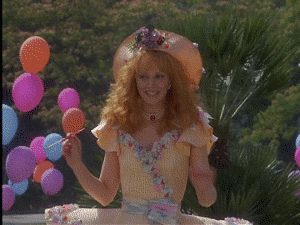 Phyllis, who has caviar for the girls at their first meeting, asks them why they aren't wearing their uniforms and they tell her they've never had a leader stick around long enough to take them shopping to which Phyllis replies, "I have a black belt in shopping!" and takes them to the place where the uniforms are purchased. Now I was a Girl Scout when I was in elementary school and I don't particularly remember wearing a uniform. I kind of remember we had a vest or a sash to put our badges on, but I don't ever recall wearing it. But that was a long time ago. When Phyllis sees the uniform she asks, "Do they only come in khaki?" She's absolutely mortified when she tries it on and when she looks in the mirror, she exclaims, "Oh my God! The color's wrong, the collar's wrong, and the material's a nightmare from hell. It's cut badly, it itches and it's not me." She takes the uniform to her tailor, a snooty French man named Henri, who disdainfully asks her, "My God, darling, what is that?" when he sees the uniform. Phyllis asks him what can he do with it and he retorts, "You mean besides burn it?" and uses a handkerchief to take the hanger it's on while making a face. This guy deserves an Oscar, bravo! Henri himself deserves whatever award they give to fashion designers. He creates these impressive, impeccable Wilderness Girls leader uniforms (yes, plural) for her to wear and she has different outfits for different occasions They are on point; they are *muah*, chef's kiss.
Phyllis, who has caviar for the girls at their first meeting, asks them why they aren't wearing their uniforms and they tell her they've never had a leader stick around long enough to take them shopping to which Phyllis replies, "I have a black belt in shopping!" and takes them to the place where the uniforms are purchased. Now I was a Girl Scout when I was in elementary school and I don't particularly remember wearing a uniform. I kind of remember we had a vest or a sash to put our badges on, but I don't ever recall wearing it. But that was a long time ago. When Phyllis sees the uniform she asks, "Do they only come in khaki?" She's absolutely mortified when she tries it on and when she looks in the mirror, she exclaims, "Oh my God! The color's wrong, the collar's wrong, and the material's a nightmare from hell. It's cut badly, it itches and it's not me." She takes the uniform to her tailor, a snooty French man named Henri, who disdainfully asks her, "My God, darling, what is that?" when he sees the uniform. Phyllis asks him what can he do with it and he retorts, "You mean besides burn it?" and uses a handkerchief to take the hanger it's on while making a face. This guy deserves an Oscar, bravo! Henri himself deserves whatever award they give to fashion designers. He creates these impressive, impeccable Wilderness Girls leader uniforms (yes, plural) for her to wear and she has different outfits for different occasions They are on point; they are *muah*, chef's kiss.
The antagonist in this movie is Velda Plendor (Betty Thomas) who is the leader of the Culver City troop who her daughter and her daughter's friend, played by a young, brunette Tori Spelling are members of. This troop wears red feathers in their caps and calls themselves the Red Feathers. This is obviously to help differeinate them from other troops since all the girls are wearing the same uniform. Velda describes herself as a mother, a widow, and an ex-army nurse. There is a running joke where her own daughter and assistant refer to her as "Miss Plendor, sir" (she refuses to let her daughter refer to her as "Mom"). She runs the first meeting all the troop leaders are gathered at and tells them, "If any of you Betty Crockers out there think you're just going to teach toddlers how to bake cupcakes, then you can leave now." Cue two elderly women getting up to leave.
 As Velda tells the other leaders, "When we're looking for new leaders, we're looking for no non-sense women", Phyllis walks in (in heels, no less) wearing one of her new creations, a uniform that has now been tailored to fit her compete with forest green piping and a cape with green silk lining and she's even carrying a cigarette stick. We'll see a reiteration of the cape in another scene, except it's lined with gold lame (pretend there's an accent mark over the e). Not surprisingly, Velda is pretty dismissive of Phyllis and when Phyllis suggests instead of selling cookies door-to-door (to save a little time and shoe leather), why don't they just have a telethon that can be hosted by "Johnny or Merv", she just rolls her eyes. After this, Velda will become obsessed with taking Phyllis down and humiliating her.
As Velda tells the other leaders, "When we're looking for new leaders, we're looking for no non-sense women", Phyllis walks in (in heels, no less) wearing one of her new creations, a uniform that has now been tailored to fit her compete with forest green piping and a cape with green silk lining and she's even carrying a cigarette stick. We'll see a reiteration of the cape in another scene, except it's lined with gold lame (pretend there's an accent mark over the e). Not surprisingly, Velda is pretty dismissive of Phyllis and when Phyllis suggests instead of selling cookies door-to-door (to save a little time and shoe leather), why don't they just have a telethon that can be hosted by "Johnny or Merv", she just rolls her eyes. After this, Velda will become obsessed with taking Phyllis down and humiliating her.
Troop Beverly Hill's first big event with Phyllis Nefler as their troop leader is an overnight camping trip. Even though it is summer (I assume, or maybe it's just nice weather since they're in Southern California), Phyllis wears a floor-length white fur coat over one of her newly tailored uniforms. Her daughter points out it's only an overnight trip: "I think we'll be back before winter." The girls are taken to the campsite (which is near the Hollywood sign) in limos and they have a service that puts their tents up for them. Around the campfire, Phyllis makes fondue al fresco for all of them and is about to show them how to make espresso, but then it starts pouring. All the girls run to the tents for shelter, but Phyllis, who is wearing her white fur coat is trying to salvage the fondue, but she ends up falling in the mud, face first (did I mention she's wearing a WHITE fur coat?). After singing a round of "Kumbaya, My Lord" (a song that is quite prevalent in this), Phyllis takes the girls to the Beverly Hills Hotel. Hmm, is Phyllis the one who invented glamping? Was glamping a thing yet in the '80s? Phyllis calls Velda who isn't home, so she leaves a hilarious message that "her recommendation for a campsite was totally unsuitable. There were no outlets and there were dirt and bugs and it rains there. We found a place that's much more us." Haha! I love how she's so indignant that there were bugs and dirt at a campsite! They manage to keep the spirit of being on a camping trip alive by telling scary stories around the fireplace. I had to laugh at the story Tiffany told with all the rich people updates. Instead of saying "It sounded like it was in the den....then it came from the attic" like any normal person, she tells the story as such: "It sounded like it was in the foyer....then it came from the maid's room." Phyllis tells them a "scary" story (the creepy music playing during it was a nice touch) about going to Cristophe's to get her hair done and instead of Cristophe, there was a stranger named Renaldo who styled her hair, but instead of giving her something sophisticated, she looks into the mirror and exclaims, "He permed me!" and all the girls scream in horror. However, I thought everybody had perms in the '80s? Or were the Beverly Hills crowd too posh for that? I can see them thinking perms are too gauche, because most perms (especially from the '80s) are especially that.
Velda got Phyllis's message so she brings her assistant, Annie (Mary Gross), to the Beverly Hills Hotel to inform Phyllis that she's supposed to be camping. Looking around the large, comfy room, she asks, "This is what you call roughing it?" Phyllis's response is, "One bathroom for nine people? Yes!" I have to side with Phyllis here. Even one bathroom with three people would be pushing it for me.
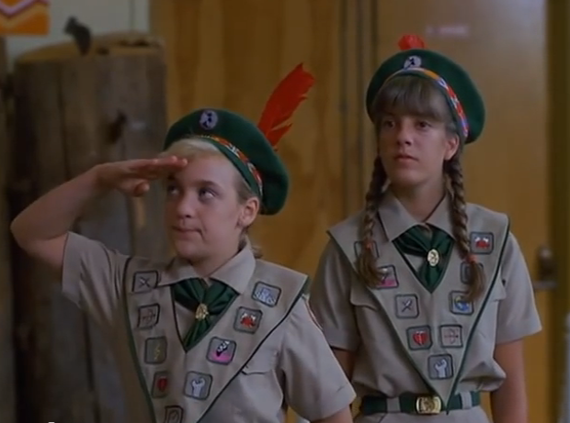 |
| Well, hello, l'il Tori Spelling! |
Velda decides to send her assistant, Annie, on an undercover mission to spy on Phyllis and her troop because she is "a threat to everything we stand for." (I think she's being a tad overdramatic here). She tells Annie, "You can infiltrate her organization, win her trust" and "We are going to form a dossier of information on her." This includes Velda cutting out the insides of a book that has a hole carved in the middle and fitting a camera in the book. She also duct tapes a tape recorder (gotta love the '80s!) under Annie's shirt and places a mic in her scarf and covers it with a broach. We will see Annie taking photos not so subtly as the camera makes loud noises everytime she snaps a photo. Probably the line that made me laugh the most is when Annie calls Phyllis to offer her help as an assistant troop leader (while Velda is listening in, of course). Phyllis is pruning an orange tree (honestly, kind of surprised she was doing yard work) and tells her, "I really would love your help. The parents in this neighborhood are so self involved - oh, sh*t, I broke a nail." Oh my God, I died! That got a big laugh from me.
At the first meeting Annie attends, the girls talk about how much they suck and how much better the Red Feathers are. Phyllis tells them she's going to show them "how to survive the wilds of Beverly Hills". We see the girls go to the aforementioned Cristophe's (luckily Renaldo wasn't there) and get manicures and pedicures. In this world, Wilderness Girls get "achievement patches" which are the equivalent to the badges that Girl Scouts obtain. We get a montage of them earning their badges, some are legit badges (like when they volunteer at an assisted living residence), but others are ones that Phyllis made up. One of those is the Jewelry Appraisal patch. Phyllis and the girls are gathered around a jewelry case at Cartier's as Tiffany is inspecting a diamond that she correctly appraises at $85,000. Two quick things: I'm impressed a twelve-year-old has an eye for this kind of thing and I'm surprised they let a twelve-year-old touch an $85,000 diamond. The jeweler tells them it's called a canary diamond. Phyllis asks him does it sing and when he says no, she presses the jewel against her ear and says, "Yes, it does" and she and the girls start singing "Kumbaya" once again.
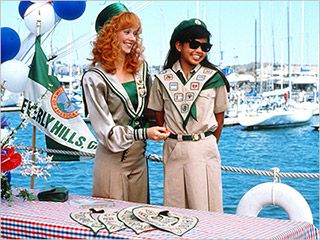 Phyllis holds a ceremony at the marina for the girls to receive their patches. Her uniform is sailor themed and I am here for it. She praises the girls for receiving 36 patches in three weeks and presents each one with the unique patches they earned. For instance, Tiffany earned the Friendship patch, the Shopping patch, and the aforementioned Jewelry Appraisal patch. Lily is presented with the International Affairs patch for teaching them "how to launder money and crash revolution". (You might remember her as the dictator's daughter). Phyllis jokingly gives Hannah the Best Daughter patch, but she has "legitimately" earned the Sushi Appreciation patch, the Fire Prevention patch (that one actually sounds like a real one), and the Gardening with Glamor patch. However, in the end, Velda will make them forfeit the patches since they aren't legit.
Phyllis holds a ceremony at the marina for the girls to receive their patches. Her uniform is sailor themed and I am here for it. She praises the girls for receiving 36 patches in three weeks and presents each one with the unique patches they earned. For instance, Tiffany earned the Friendship patch, the Shopping patch, and the aforementioned Jewelry Appraisal patch. Lily is presented with the International Affairs patch for teaching them "how to launder money and crash revolution". (You might remember her as the dictator's daughter). Phyllis jokingly gives Hannah the Best Daughter patch, but she has "legitimately" earned the Sushi Appreciation patch, the Fire Prevention patch (that one actually sounds like a real one), and the Gardening with Glamor patch. However, in the end, Velda will make them forfeit the patches since they aren't legit.
We get an idea of just how destitute Emily's family is when Phyllis informs the girls before the ceremony that they will have to bring 7.50 for the patches. That's seven dollars and fifty cents; not seven hundred and fifty dollars (which would be a bit ridiculous!) Emily gets very upset because she is unable to afford this. Girl, why is you dad driving a fancy-ass car if he can't afford to give you a measly seven dollars and fifty cents?? Luckily, Tiffany, the girl obsessed with money, lends her ten dollars, but not before making a joke about interest.
Phyllis takes the girl to court for a divorce hearing; they are there "to attest the division of property." She tells the judge, "The workings of the wonderful American judiciary system are something that every child should witness, especially with a woman like you in charge" for the reason why she brought her Wilderness Girls troop. She sure knows how to butter somebody up, which she is doing since she is late. Her excuse? "My troop and I were busy describing the fall fashion to the blind. One man said he could actually feel the colors." I'm guessing these were people who went blind later in life? There's a funny moment where both Hannah and Claire say hello to their fathers since Claire's dad is Mr. Nefler's lawyer. Phyllis finds out that Freddy wants to speed the process along because he is thinking of remarrying; he's been seeing his realtor.
Annie shows Velda all the photos she's been surreptitiously (except not so much) taking and I noticed there was one shot which is at the wrong angle. We see a photo of the girls when they were at Cartier, but the photo is shown from where the camera (the movie camera, that is) would have been; where Annie was standing, her photo would have been at a different angle. I'm just saying. Even though Velda thinks she has a lot of incriminating evidence, the head of the Wilderness Girls organization isn't fazed by them, so Velda gets the idea for Annie to move in with Phyllis so they can really spy on her. I mean, she is becoming borderline obsessed with Phyllis. When Annie tells Phyllis that her apartment is being fumigated and she won't be able to live there for a couple of weeks, Phyllis is more than happy to let her stay with her (she does have plenty of room, after all!)
It's cookie time! At a rally all the Wilderness Girls of SoCal attends, Velda informs them the troops who sell more than 1000 boxes of cookies will be able to attend the annual Jamboree. Whichever troop wins the Jamboree will be the poster troop for the following year. I love when Phyllis is excited about this, but then asks what a jamboree is. From what I gather, each troop gives the number of boxes they plan to sell and have to reach that goal. I didn't quite get this because the Beverly Hills troop decides to sell 2000 boxes. But what's the point of selling 2000 when you only need to sell 1000 to attend the Jamboree? And what happens if they don't sell 2000, but do sell at least 1000? Do they not get to attend because they didn't reach their goal? But then why have goals if all they need is to sell 1000? Am I making too much of this? Probably, since in the end it doesn't really matter.
The Red Feathers do our girls dirty when they sell cookies in their ritzy Beverly Hills neighborhood, including to Kareem Abdul-Jabbar. It's at that moment when Annie throws away the secret camera and dossier on Annie and is now firmly on Team Nefler.
Instead of just having the parents buy all the boxes of cookies (well, except for Emily's dad since he can't even afford anything that's ten dollars), Phyllis wants the girls to do something that will "enhance community spirit." This leads us to a fantabulous montage of them selling cookies, which includes putting on a concert and singing an original song called "Cookie Time". Seriously, how was this movie not nominated for Best Original Song? Or best Costume Design for that matter? Inquiring minds want to know! Highlights of this montage include:
-The song! It is a bop and a half.
-The song! It is a bop and a half.
-Jasmine wearing a Tina Turner wig.
-Money-obsessed Tiffany getting the line, "Cheap at even twice the price" because of course she would.
-When the girls are shilling out cookies at Spago and someone asks if they take American Express and Jasmine says, "We prefer Visa."
-Vicki Sprantz signing her new book, "Malibu Bitch" (sounds like the essential beach read) while her TV actress daughter signs boxes of cookies a few feet away from her.
Phyllis calls Velda to tell her, "We didn't sell 2000 boxes of cookies" and you see Velda smiling
smugly, but it quickly vanishes when Phyllis tells her that they sold 4,732 boxes. She invites her to a gala that Chica's parents (I think it was her parents) are throwing for them when their check is presented. At the party, Velda finds out that Annie has gone to the dark side (or has she left the dark side?) Annie is wearing a dress that Hannah found for her in her mom's closet. I was kind of surprised that Phyllis had this dress because it was just ugly and seemed quite plain next to her more outrageous outfits. It looked like Annie was wearing a black trash bag with a pink tutu and two pink ribbons wrapped around her bodice. I didn't buy this dress coming from Phyllis's closest, it was kind of on the trashy (no pun intended) side. I also didn't really care for the dress Phyllis herself wore. It looked like a dyed egg painted for Easter exploded on her!
smugly, but it quickly vanishes when Phyllis tells her that they sold 4,732 boxes. She invites her to a gala that Chica's parents (I think it was her parents) are throwing for them when their check is presented. At the party, Velda finds out that Annie has gone to the dark side (or has she left the dark side?) Annie is wearing a dress that Hannah found for her in her mom's closet. I was kind of surprised that Phyllis had this dress because it was just ugly and seemed quite plain next to her more outrageous outfits. It looked like Annie was wearing a black trash bag with a pink tutu and two pink ribbons wrapped around her bodice. I didn't buy this dress coming from Phyllis's closest, it was kind of on the trashy (no pun intended) side. I also didn't really care for the dress Phyllis herself wore. It looked like a dyed egg painted for Easter exploded on her!
We learn that Tessa's dad (the director) has cast Emily's dad (the out of work actor) in his new film that seems to be The Godfather. Now, does The Godfather not exist in this world and her dad is going to be the next Marlon Brando or is this a rendition of The Godfather? Also at the gala is Freddy who is impressed with Phyllis and showers her with compliments. He tells her that she looks great, that she's turned around completely, that he's proud of her. He tells her he has "something very important" to talk to her about and she think he wants to get back together since he said he broke up with his girlfriend, but he wanted to discuss the custody arrangement of Hannah.
The Jamboree is coming up and Velda tells Phyllis that she's not fit to lead the girls, that "somebody's going to get hurt and it's going to be all your fault." Oh, somebody will get hurt on the Jamboree, but it won't be Phyllis's fault. When Phyllis gathers the girls for a meeting and tells them she's not qualified to take them on the Jamboree, they tell her that she can't quit, that they've come this far and she's done so much for them. One of the girls tells her, "You're our role model and our friend." Tessa, the nerdiest of the group (and the one who goes to therapy), tells her, "You took a group of overindulged, unmotivated alienated preadolescents and gave us a renewed sense of self esteem." Even Freddy, who overhears them, tells her that she's come too far to quit now.
With all that motivation and support behind her, Phyllis, Annie, and the eight Wilderness Girls drive to the 60th Annual Wilderness Jamboree where Velda is a little dismayed (and annoyed) to see them. They drive up in two cars with the words "You gotta believe" and "We [heart] Beverly Hills" painted on the sides of each one. The main (and only, it seems) event is the survival competition where each troop will follow a path that is designated by their flag. Each troop has a different colored flag, blue for Beverly Hills. (Surprised it wasn't cerulean!) There are only four troops; we really aren't supposed to care about any of them except our girls and the Red Feathers. Since only Wilderness Girls and their troops leaders are allowed to compete, Velda does them dirty by firing Annie for really no good reason so Annie, the most experienced one on their troop, won't be able to accompany them. I didn't realize Velda had the power to do this since she's not the head of the entire Wilderness Girl organization (even though she acts like it). Obviously they do this because it would be too easy if they had Annie on their team and they need to have a little conflict for them. Even though Velda is the troop leader for the Red Feathers, she does not compete in the Jamboree since she created the course and knows everything about it. Instead, one of her assistant troop leaders will lead her troop.
When trying to figure out which direction they need to go, Phyllis says, "Gucci is north of Wilshire. The Beverly Wilshire Hotel is west. I think the campsite is at Cartier, so to speak." Feeling confident that they figured out their first task, they continue on. We see one of the little brats from the Red Feathers turn a blue arrow meant for Troop BH so they will go in the wrong direction and it leads them to Dead Man's Swamp where they run screaming after seeing a water moccasin. This leads them back on the trail where they encounter a skunk and they seem to be even more scared of it than the snake (look, I wouldn't want to encounter a skunk either, but I'd rather smell bad than be dead!) and hightail it down the path which leads them to the finish line mere seconds before the Red Feathers reach it. The Beverly Hills girls completed the course in 6 hours and 28.5 seconds and the Red Feathers completed it in 6 hours and 29 minutes. As you can imagine, Velda is livid. She blames the skunk since that's the reason the girls were running so fast. The skunk must have chased them because it also crosses the finish line and Velda picks it up (she's brave!) and tells it, "You're going to pay for this!" Pay, it did. The next scene we see is Velda at a campfire wearing a fur skunk cap, and roasting meat in the fire, presumably the skunk.
Since Velda already isn't playing fair, she tells her assistant leader that she (Velda) will be talking over tomorrow because the assistant will have to go home because she will be too sick to continue. For some reason, when she makes this announcement the next day, nobody disputes her. Oh, sure, there are cries of unfairness from the BH troop, but there's really nothing anybody can do about it. We get a little chant from our girls: "We're the girls from Beverly Hills....Shopping is our greatest skill" complete with these super dorky dance moves. They're doing this as a marching song, but when they stop and do those dance moves it doesn't make sense because it slows them down, it doesn't keep them moving. I will say the "Beverly Hills, what a thrill!" chants are very catchy.
They come to a rope bridge that has been cut by Velda in order to sabotage them. Phyllis pouts, "It really frosts my cookies that we have worked so hard and we have come so far, and now we have to stop." Hannah points to a large log that is covering the (ridiculously deep) ravine and wants to walk across it. Now as you may remember, the Neflers have a balance beam in their house that Hannah practices on, so we have come full circle. Phyllis tells her it's too dangerous and that "Only an idiot would walk across that... I'm going to do it."
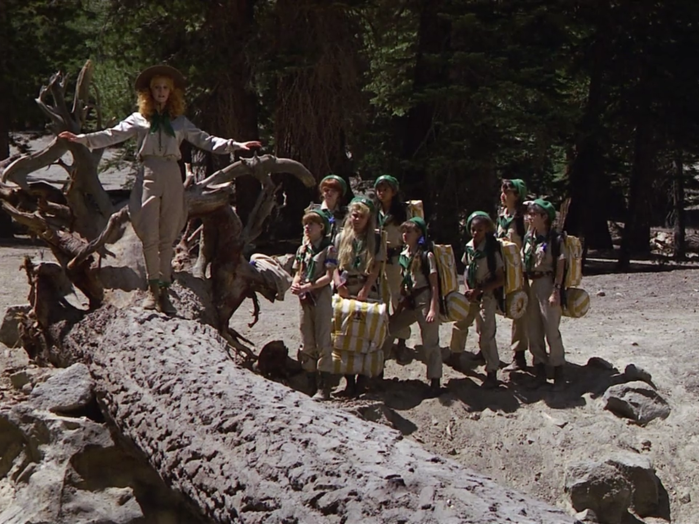 I'm not gonna lie; this scene made me anxious. It made me jump a few times, especially when it looked like she was going to fall. I knew this wasn't the type of movie where a beloved troop leader was going to fall to her death, but it still made me nervous! For example, when she's reached the middle of the log, she turns her head back towards the girls to tell them, "This isn't so bad", then almost loses her balance and everyone, including me, gasps loudly. A few steps later, Phyllis trips and fall on the log, scaring the girls (and me), but manages to stay on. It appears she's really close to the other side and she could easily scooch herself to solid land. Which begs the question, why didn't she just sit on her butt and move across that way instead of walking? If I had to cross something that high, that's what I would do. Hannah decides she's going to help her mom and also starts to walk across. I understand she's practiced on her balance beam, but there's a huge difference when you're a few feet away from a floor that is covered by a gym mat and when you're 100 feet (I could be a little hyperbolic there, but it did appear very deep!) above your impending death. Hannah gets her foot stuck in a groove and Phyllis gets up and turns around and goes to help her daughter. So basically Hannah went across for nothing because her mom didn't need her help and now she's no longer close to the other side. The mother and daughter make it across (of course) and fix the broken bridge so the other girls can cross it. One of the girls muses that they could have a chance to win and Phyllis tells the girls that they've already won because they didn't quit, they didn't cheat, and they didn't call home when they were in trouble; they worked as a team.
I'm not gonna lie; this scene made me anxious. It made me jump a few times, especially when it looked like she was going to fall. I knew this wasn't the type of movie where a beloved troop leader was going to fall to her death, but it still made me nervous! For example, when she's reached the middle of the log, she turns her head back towards the girls to tell them, "This isn't so bad", then almost loses her balance and everyone, including me, gasps loudly. A few steps later, Phyllis trips and fall on the log, scaring the girls (and me), but manages to stay on. It appears she's really close to the other side and she could easily scooch herself to solid land. Which begs the question, why didn't she just sit on her butt and move across that way instead of walking? If I had to cross something that high, that's what I would do. Hannah decides she's going to help her mom and also starts to walk across. I understand she's practiced on her balance beam, but there's a huge difference when you're a few feet away from a floor that is covered by a gym mat and when you're 100 feet (I could be a little hyperbolic there, but it did appear very deep!) above your impending death. Hannah gets her foot stuck in a groove and Phyllis gets up and turns around and goes to help her daughter. So basically Hannah went across for nothing because her mom didn't need her help and now she's no longer close to the other side. The mother and daughter make it across (of course) and fix the broken bridge so the other girls can cross it. One of the girls muses that they could have a chance to win and Phyllis tells the girls that they've already won because they didn't quit, they didn't cheat, and they didn't call home when they were in trouble; they worked as a team.
While all of this is going on, Velda is spying on them with her binoculars and decides to take her girls through a short cut. Tori tells her it might be dangerous because the map says it's for hunters and trappers. Velda replies, "It's only dangerous when you don't know what you're doing" and mere seconds later she falls through a trap hole and is howling about her ankle. Cleo, her daughter, makes an executive decision to carry on without her because she's dead weight and assures her that after they win they'll send someone back for her, but Velda is not thrilled by this. She screams at her troop so loudly that Phyllis and her girls can hear her. Phyllis tell the girls, "It's probably just one of nature's beasts" and she's not too far off. Velda screams some more and Phyllis recognizes who it is and leads her troop towards the screaming.
Tessa assess Velda's foot injury and seems to know an awful lot about podiatry for some reason. Her diagnosis is, "There's multiple contusions, possibly a cracked fibula, and a severe personality disorder." Ooh, burn! Phyllis wants to take her down for medical attention and Velda accuses her of wanting to know the quickest way to get there so they can win. The girls don't want to help her and think they should just leave her there and make her somebody else's problem. As Phyllis puts it, "It's a real moral dilemma." In a funny scene, the girls huddle, for like five seconds and you can hear someone say quite clearly, "I think we should leave her. She's a pain." Phyllis convinces them to help her and this is when the backpacks they debuted at the Wilderness Craft Day come in handy as they create a makeshift gurney with them for her to sit in. Despite Velda's constant griping, they march forth with her.
Tessa's dad, the Hollywood director, is at the finish line with a camera and crew to film the whole thing and is shouting out directions for how he wants the shot to look. I would be so embarrassed if I were Tessa! Unsurprisingly, the Red Feathers are first and I laughed when Cleo says, "I'd like to say the other three teams gave us a real run for our money...but they didn't" after she claims the trophy. Also unsurprisingly, their win doesn't count since their troop leader wasn't with them and I saw that coming a mile away. After hearing this, Cleo grabs the trophy and runs away with it.
Troop Beverly Hills are the second to arrive, but of course they are the real winners since everybody is accounted for. The head of the organization apologizes for not having a trophy for them and they say they don't need a trophy because all they wanted to do was prove that they were real Wilderness Girls. And they did. Awww. They are featured on the 1990 Wilderness Girls poster. Oh, and Phyllis and Freddy get back together.
If you are curious to see all the outfits Phyllis Nefler wore, somebody ranked all of them.
